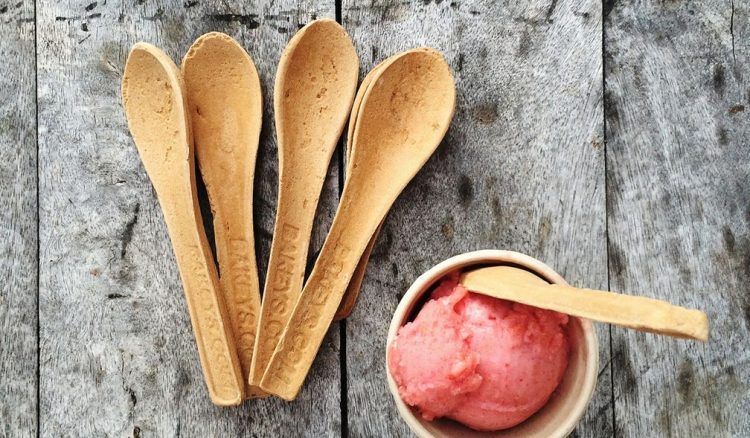
When Narayana Peesapaty founded Bakeys in India, he was hoping to provide an inexpensive alternative to plastic utensils. With the increased use of plastic within the large Indian population, plastics have become a huge environmental problem. He wanted to develop utensils which would be rapidly biodegradable, use minimal natural resources and create an industry to provide jobs.
Peesapaty had already completed fifty consulting assignments related to many facets of renewable energy technology and agricultural business in his position as Associate Research Director at AC Neilsen ORG-Marg in Baroda, India before he launched Bakeys. His BSC (Hons) in Chemistry from Osmania University and an MBA from IIFM- Bhopal prepared him well for the task facing him. Little did he know how popular his one-time-use spoons would become, nor how quickly his orders would reach 4.17 million.
While Peesapaty’s factory produces three flavors of perfectly formed spoons, made from sourghum, water and spices, the savory, sweet and plain spoons are primarily available in India. The company is rapidly growing and taking steps to complete shipments elsewhere, but the extreme growth has created distribution problems, which signify success, but also make it difficult for everyone to have the popular items.
Making alternate versions in any home kitchen, is a good alternative. With a good recipe and a bit of time, the ecologically minded can come up with some useful cutlery until a Bakeys order can be fulfilled. The following recipe was developed by Yuka Yoneda for inhabitat:
The ingredients for making home-made utensils are basic to most kitchens:
- 3 and ½ cups of flour
- 1 cup of water
- 1 teaspoon of salt
The tools required are also basic:
- Small knife
- Scissors
- Rolling pin
- Baking sheet
- Metal spoons
The steps are simple, but some hands-on skills are required:
- Step One – Preheat the oven to 375 degrees Fahrenheit.
- Step Two – Pour the water into a bowl, stirring in the flour gradually until the mixture is too thick to stir.
- Step Three – Dust a cutting board or surface with flour and transfer flour mixture to it. Pat the mixture with both hands and roll into a dough ball. Lightly dust with flour.
- Step Four – Use the rolling pin to roll out the dough until it is ¼ inches thick sheet.
- Step Five – Cut out spoon, knife and fork shapes using the metal spoon as a guide for the handle lengths and utensil shapes. Use the small knife to carefully cut out the dough cutlery.
- Step Six – Cover the baking sheet with parchment paper, place prepared utensils in the pan and bake for until golden brown, about thirty minutes.
- Step Seven – Allow the cutlery to cool for a few minutes.
- Step Eight – Use the utensils for eating, and eat the utensils or discard after using.
Edible utensils will not do well with cutting through foods. Edible forks have clumsy tines in comparison to regular ones. Edible knives do not have sharp edges, though their shapes may resemble sharpened versions. This may explain why Bakeys only manufactures edible spoons. Spoons can scoop, push, pull and hold food much more easily than forks and knives.
In fact, some cultures do not use forks and knives while dining at all. Some use only hands and fingers to eat. For many, including sharp objects at the meal table is considered rude because it reminds the diners of the sharp knives used to hunt and kill game. It also evokes thoughts of the butcher and the butchering process, which is also considered very indelicate. For practicing vegetarians, religious beliefs also motivate which utensils will be used, and for this reason, cutlery, which most often refers to cutting tools, is avoided.
Regardless of distinctive cultural and religious eating practices, the idea of using edible and certainly biodegradable eating tools is more than simply intriguing. It is an idea that encompasses opportunities. Bakeys has a well-developed business vision incorporating several key points which promote global awareness and action:
- Edible utensils can be eaten as part of the meal
- If not eaten, utensils can be discarded to be eaten by animals and insects
- The utensils degrade into the natural environment in three days or less
- The natural flours do not contain additives or preservatives, which make them healthier to eat
- When made with sorghum, much less water is necessary, as this millet needs less to grow
- Encouraging rice farmers to farm sorghum saves water, while allowing the farmer to reap a monetary harvest
- Tons of water thirsty rice crops rot in warehouses annually, so switching to sorghum reduces waste during growth and after harvest
- Plastics are derived from petroleum, and they contain toxins which may cause cancer
- Some view utensils as prime sources for leaching toxins into foods
- Inexpensive plastics lead to expensive health hazards
- Inexpensive natural utensils protect health, preserve the environment and provide jobs
Why not try the latest in kitchen ware? Whether supporting the Bakeys product, or simply trying a hand at creating a homemade version; the idea is pure genius.


Comments
Loading…